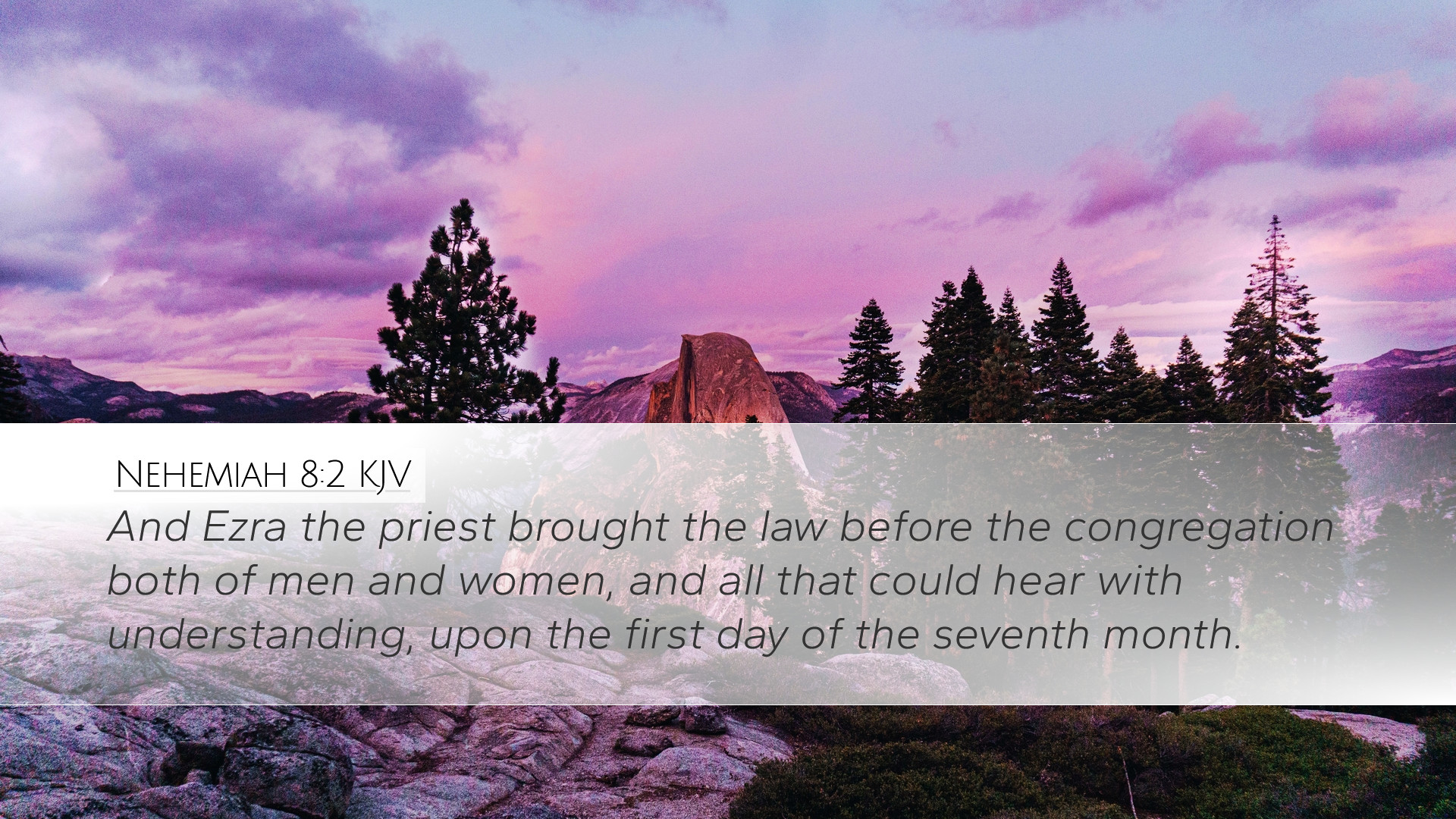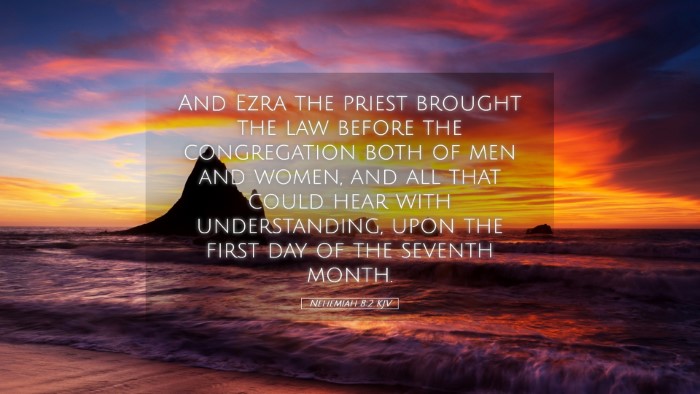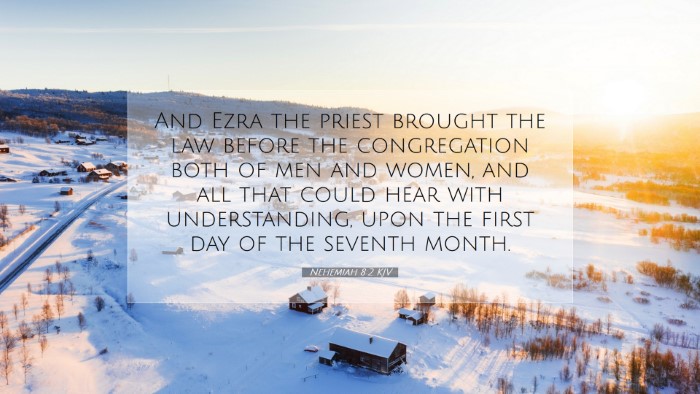Old Testament
Genesis Exodus Leviticus Numbers Deuteronomy Joshua Judges Ruth 1 Samuel 2 Samuel 1 Kings 2 Kings 1 Chronicles 2 Chronicles Ezra Nehemiah Esther Job Psalms Proverbs Ecclesiastes Song of Solomon Isaiah Jeremiah Lamentations Ezekiel Daniel Hosea Joel Amos Obadiah Jonah Micah Nahum Habakkuk Zephaniah Haggai Zechariah MalachiNehemiah 8:2
Nehemiah 8:2 KJV
And Ezra the priest brought the law before the congregation both of men and women, and all that could hear with understanding, upon the first day of the seventh month.
Nehemiah 8:2 Bible Commentary
Commentary on Nehemiah 8:2
Nehemiah 8:2 states:
"So Ezra the priest brought the law before the assembly of men and women and all who could hear with understanding on the first day of the seventh month."
This verse narrates a pivotal moment in the post-exilic community of Israel, where the Word of God is restored to its rightful place within the life of the people. The act signifies a rekindling of spiritual fervor and commitment to God’s commandments. Below we will explore various aspects of this text through insights from public domain commentaries.
Context and Historical Background
Nehemiah chapter 8 occurs after the wall of Jerusalem has been rebuilt, and the Jewish people are re-establishing their identity and covenantal relationship with God. Public readings of the Law were integral to their collective identity and spiritual renewal.
The Role of Ezra
Matthew Henry comments on Ezra's significant position as a scribe and priest, emphasizing his devotion to God's Word and how he was instrumental in teaching the nation. His leadership during this assembly is a reflection of his commitment to the spiritual growth of the people.
Albert Barnes notes the qualifications of Ezra as an educator who brought the Law “before the assembly of men and women” to ensure inclusivity, highlighting the importance of his role in educating the whole community, not just the men.
Understanding and Intent
The verse specifies that Ezra read the Law “to all who could hear with understanding,” indicating a targeted approach to teaching religious texts.
- Adam Clarke remarks on the necessity of comprehension in spiritual matters, suggesting that the aim was not just to read the Law, but to ensure it was grasped and internalized by the listeners.
- Matthew Henry reinforces the idea that Scripture should be accessible to all, as understanding the Law is vital for spiritual renewal and communal unity.
Significance of the Timing
The assembly took place on “the first day of the seventh month,” which is significant as it coincides with the Feast of Trumpets, a time of spiritual reflection and renewal.
- According to Albert Barnes, this timing was intentional as festivals were designed to bring the people together, promoting unity through shared worship and remembrance.
- Adam Clarke draws attention to the liturgical rhythms that shape the Jewish community's life and spirituality, with this particular gathering emphasizing the need for a return to God’s Word during a sacred time.
Implications for Spiritual Leadership
The actions of Ezra provide a model for spiritual leaders today. He exemplifies several virtues:
- Teaching and Preaching: Ezra’s reading of the Law is a clear model for pastoral ministry focused on Scripture. Leaders are called to bring the Word before the people, much like Ezra.
- Inclusiveness: Ezra’s awareness to include everyone in the assembly highlights the importance of accessibility in ministry, emphasizing that all have a right to hear and understand God’s message.
- Systematic Approach: Ezra’s structured approach to reading and interpreting the Law underscores the importance of preparation and clarity in teaching the Scriptures.
Reflection on Community Response
The gathering under Ezra’s leadership resulted in a profound communal response. As the people heard the Word of God, it stirred their hearts and called them to repentance. Matthew Henry observes that the reading of the Law often ignited a sense of conviction among the people, leading to transformation and renewal.
The Call to Action
This narrative begs the question for today’s readers: How do we respond to God's Word when it is proclaimed in our midst? Community engagement and personal reflection are vital components as we seek to apply the timeless truths of Scripture to our lives.
Conclusion
Nehemiah 8:2 stands as a testament to the power of Scripture in collective identity and spiritual renewal. The leadership of Ezra, the inclusivity of the assembly, and the act of reading the law serve as an enduring reminder of the centrality of God’s Word in the life of His people.
As pastors, students, and theologians engage with this text, may it inspire a renewed commitment to the proclamation of the Word, the cultivation of understanding within the community, and the transformative power of Scripture in the lives of believers.


